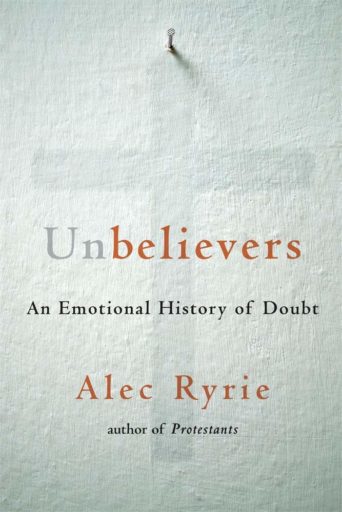Alec Ryrie, a British historian of religion who describes himself as “a believer with a soft spot for atheism,” has written a necessary, if unanticipated, book. In Unbelievers: An Emotional History of Doubt, Ryrie rejects the standard, if factually problematic, account that the decline of religious faith in the West is explained by a growing rejection of dubious theological claims for more persuasive philosophical and scientific ones. Few people, Ryrie claims, arrive at their beliefs, values, and identities after a dispassionate review of all available information. Most commit themselves intuitively, often without being able to articulate why. It’s only when asked that they assemble reasons to justify decisions reached by other means.
The driving emotions in Ryrie’s revisionist history of disbelief are anger toward a corrupt and overbearing church and anxiety over the fate of the soul. No surprise there. The book has its flaws, but I’m inclined to forgive them. Ryrie’s account matches my own rejection of what I was told to believe about the United States. My crisis of faith with the self-proclaimed “greatest nation on earth” was first and foremost emotional, as I worked with and listened to Native American children and impoverished Central American families. Rational argument came later. Yet my sense of homelessness in the country of my birth bears all the marks of having been raised American. I care about the practices and politics from which I’m estranged in much the same way many former Christians can’t shake questions and concerns central to their lapsed faith.
Luke Hankins, founder and editor of Orison Books as well as a fine poet himself, fits that mold. The back cover of his new collection, Radiant Obstacles (Wipf and Stock), describes Hankins as having broken “with the fundamentalist religion of his upbringing,” yet there are many ways to break from one’s past. The books Hankins publishes and the poems he writes reveal an abiding interest in bedrock theological and philosophical questions.
He also shuns the vacuous bourgeois abstractions that lately pass for “spirituality” and recognizes the awful gulf between the word and the thing. Doubt, faith, language, and embodiment are of a piece for Hankins, and rightly so. He hungers for meaning in a silent creation, waiting – despite himself – for the earth to speak. He invites the reader to touch the word for “flower” before asking “Is there any nectar there?” He stumbles through a world of opacities, “praying (in my language) / to the absent Referent.”
For someone who writes, “Of all the things I’ve lost / along with my faith, I’ll miss most / the ability to pity God,” and offhandedly mentions “my simultaneous loss of faith and fear of hell,” Hankins has much to say about the Creator. While Hankins never explicitly states what he believes or disbelieves, his missing deity isn’t a club with which to beat those whose thoughts, convictions, and habits offend him. If “God” becomes a word without clear referent, it remains a difficult and demanding term to be wrestled with in the blood, sand, and sweat of embodied existence. Riffing on Elaine Scarry’s insight that “Beauty brings copies of itself into being,” Hankins asks if ants, artists, mosquitoes, dogs, and heartworms, “are not equally beautiful to God.” He struggles to reconcile the real, self-emptying love of his mother and friends with his youthful image of a wrathful father-God. Perhaps that’s why Hankins uses feminine pronouns for the Divine. He wonders if creation is a troubled dream and, if so, wouldn’t it be better if the divine dreamer should “wake into a better state of mind?”
These are questions with a long and fruitful theological pedigree, and in a drunken dream/vision of his own, Hankins finds himself in the company of Teresa of Avila, John of the Cross, Rumi, and others who pondered them in a time when orthodox theology and lived spirituality weren’t treated as separate fiefdoms. These are poems that will lead believers and disbelievers alike from the mind’s airy labyrinths to the practical wisdom of the body, as in this short, profound lyric:
When the mind cannot, the body knows how to praise
In my room at night I dance before God,
unthinking, at last.
She makes my mind go quiet,
She makes my body dance.
I was excited to hear that Orison Books was publishing Frank Paino’s first new collection in over two decades. Paino’s The Rapture of Matter (1991) was a visionary debut, graced with bodies ecstatic and suffering, making what sense they can of a world that’s beautiful and horrific in the same moment. His new volume, Obscura, distills that vision in meticulously crafted lines, vibrant images, and verbal music. His work is informed by a Catholicism not so much lapsed as laid waste, the landscape of his imagination dotted with ruined fragments of a story no longer tenable. God sometimes comes up as an idea, though rendered in lower case.
If Paino’s eye is often drawn to the grotesque and – as the collection’s title suggests – the obscure, he meditates on these with rapt attention, finding beauty in what otherwise would be merely lurid, discovering sublimity in kitsch, humor in the disconcerting, and life in the morbid. He guides us to glass coffins and artifacts singed from alleged purgatorial visitations. He introduces us to Laika, the doomed canine cosmonaut, and the lusty tapeworm Maria Callas was rumored to have swallowed in her quest to shed weight. He deconstructs biblical narratives and limns the erotic contours of asceticism.
Like all worthwhile poetry, Paino’s verse must be read aloud to hear its music and taste the words upon the tongue, as in “Soon, the room will be trellised in shadow. Soon / stars will shiver like water sluiced from uplifted wings.” Nothing is haphazard here, each line evincing exacting revision, sound and sense harmonized without feeling artificial or mannered.
Paino also knows how to end a poem, a matter of craft Wendell Berry says is “always a test” of a poem’s quality. His closing lines can be devastating, provocative, mysterious, or amusing, but they all lead the reader to the next room of the poem, that inner chamber where we puzzle out what just happened. There, he leaves us, altered by what we’ve seen and heard. Paino tells us as much in the conclusion to an ekphrastic poem inspired by a photograph of a woman who took her own life:
Let we who did not know her be absolved for finding beauty in such broken truth – for, having looked upon her, being powerless to turn away.
Reading Hankins and Paino reminds me of Stanley Hauerwas’s claim that North American Christianity’s chief enemy isn’t atheism, but sentimentality. Christians, Hauerwas adds, can see just how sentimental they’ve become by their inability to produce interesting atheists. In one sense, that’s true. Yet who cares if Richard Dawkins and Sam Harris peddle their snarky retorts to seventeenth century theological mistakes? They’re only preaching to their choir. Here, however, are truly interesting disbelievers who just might have an antidote to sentimentality’s spiritual poison. What’s more, they’re masters of their craft. That alone should be sufficient reason to read them, no matter where or in whom you put your faith.
Brian Volck is a pediatrician and writer living in Baltimore. He is the author of a poetry collection, Flesh Becomes Word, and a memoir, Attending Others: A Doctor’s Education in Bodies and Words. His website is Brianvolck.com





